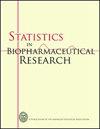The NISS Ingram Olkin Forum on Unplanned Clinical Trial Disruptions
IF 1.5
4区 医学
Q3 MATHEMATICAL & COMPUTATIONAL BIOLOGY
引用次数: 0
Abstract
CONTACT Nancy Flournoy flournoyn@missouri.edu Department of Statistics, University of Missouri (emerita), Columbia. The efforts arose from working groups formed during a NISS Ingram Olkin Forum series on the following topics: (1)Estimands and Missing Data, (2) The Role of Randomization Tests, (3) Methods to Cope with Information Loss and the Use of Auxiliary Sources of Data and (4) Bayes and Frequentist Approaches to Rescuing Disrupted Trials. These groups consider how existing methods can be applied in the context of unplanned clinical trial disruptions and uncover unsolved issues requiring further research. In addition to introducing you to these research projects, I am pleased to provide a brief introduction to the NISS Ingram Olkin Forums. The National Institute of Statistical Sciences (NISS) created Ingram Olkin Forums (IOFs) to foster Statistics Serving Society (S3) in memory of Professor Ingram Olkin. Motivated by the aspirations set forth by Olkin et al. (1990), each forum focuses on a current societal issue that might benefit from new or renewed attention from the statistical community. IOFs aim to bring the latest innovations in statistical methodology and data science into new research and public policy collaborations, working to accelerate the development of innovative approaches that impact societal problems. As a Forum brings a particular group of experts together for the first time to consider an issue, new energy and synergy is expected to produce a flurry of new ideas and approaches. The inaugural IOF was held in June 1919 on Gun Violence, prior to the arrival of the Covid-19 pandemic. Knowing that many statisticians would use their expertise to monitor the pandemic and to design vaccine and therapeutic trials, the IOF Committee looked for a need that might be neglected and decided to host an online IOF on Unplanned Clinical Trial Disruptions. A major concern in moving online was not to get stuck with one-directional webinars, but to get statisticians and other scientists who did not know each other previously to work together without meeting in-person. I am delighted to announce four papers resulting from this IOF will appear in Statistics in Biopharmaceutical Research. NISS is very happy with how well the IOF on Unplanned Clinical Trial Disruptions met its S3 objectives, with enthusiastic collegiality and productivity, and although in-person and hybrid launches will again be possible, this IOF is now NISS’s model.NISS Ingram Olkin非计划临床试验中断论坛
联系Nancy Flournoy flournoyn@missouri.edu哥伦比亚密苏里大学统计学系(荣誉退休)。这些努力来自于NISS英格拉姆·奥尔金论坛系列会议期间组成的工作组,讨论以下主题:(1)估计和丢失数据;(2)随机化测试的作用;(3)处理信息丢失和使用辅助数据源的方法;(4)挽救中断试验的贝叶斯和频率方法。这些小组考虑如何将现有方法应用于计划外临床试验中断的背景下,并发现需要进一步研究的未解决问题。除了向大家介绍这些研究项目外,我还很高兴为NISS英格拉姆·奥尔金论坛做一个简短的介绍。为了纪念英格拉姆•奥尔金教授,国立统计科学研究所(NISS)创建了英格拉姆•奥尔金论坛(IOFs),以培育“统计服务社会”(S3)。在Olkin等人(1990)提出的愿望的推动下,每个论坛都侧重于当前的社会问题,这些问题可能会从统计界的新关注或重新关注中受益。IOFs旨在将统计方法和数据科学的最新创新引入新的研究和公共政策合作中,努力加速影响社会问题的创新方法的发展。由于论坛首次将一群特定专家聚集在一起审议一个问题,预计新的能量和协同作用将产生一系列新的想法和方法。首届IOF于1919年6月在2019冠状病毒病大流行到来之前举行,主题是枪支暴力。认识到许多统计学家将利用他们的专门知识来监测大流行并设计疫苗和治疗试验,临床试验联合会委员会寻找可能被忽视的需求,并决定举办一次关于意外临床试验中断的在线临床试验联合会。转向网络的一个主要问题是不要陷入单向的网络研讨会,而是要让以前互不认识的统计学家和其他科学家在没有面对面会面的情况下一起工作。我很高兴地宣布,这次IOF的四篇论文将发表在《生物制药研究中的统计学》杂志上。NISS对IOF在计划外临床试验中断方面的表现感到非常高兴,因为它具有热情的合作精神和生产力,能够很好地实现其S3目标,尽管面对面和混合发射将再次成为可能,但这种IOF现在是NISS的模式。
本文章由计算机程序翻译,如有差异,请以英文原文为准。
求助全文
约1分钟内获得全文
求助全文
来源期刊

Statistics in Biopharmaceutical Research
MATHEMATICAL & COMPUTATIONAL BIOLOGY-STATISTICS & PROBABILITY
CiteScore
3.90
自引率
16.70%
发文量
56
期刊介绍:
Statistics in Biopharmaceutical Research ( SBR), publishes articles that focus on the needs of researchers and applied statisticians in biopharmaceutical industries; academic biostatisticians from schools of medicine, veterinary medicine, public health, and pharmacy; statisticians and quantitative analysts working in regulatory agencies (e.g., U.S. Food and Drug Administration and its counterpart in other countries); statisticians with an interest in adopting methodology presented in this journal to their own fields; and nonstatisticians with an interest in applying statistical methods to biopharmaceutical problems.
Statistics in Biopharmaceutical Research accepts papers that discuss appropriate statistical methodology and information regarding the use of statistics in all phases of research, development, and practice in the pharmaceutical, biopharmaceutical, device, and diagnostics industries. Articles should focus on the development of novel statistical methods, novel applications of current methods, or the innovative application of statistical principles that can be used by statistical practitioners in these disciplines. Areas of application may include statistical methods for drug discovery, including papers that address issues of multiplicity, sequential trials, adaptive designs, etc.; preclinical and clinical studies; genomics and proteomics; bioassay; biomarkers and surrogate markers; models and analyses of drug history, including pharmacoeconomics, product life cycle, detection of adverse events in clinical studies, and postmarketing risk assessment; regulatory guidelines, including issues of standardization of terminology (e.g., CDISC), tolerance and specification limits related to pharmaceutical practice, and novel methods of drug approval; and detection of adverse events in clinical and toxicological studies. Tutorial articles also are welcome. Articles should include demonstrable evidence of the usefulness of this methodology (presumably by means of an application).
The Editorial Board of SBR intends to ensure that the journal continually provides important, useful, and timely information. To accomplish this, the board strives to attract outstanding articles by seeing that each submission receives a careful, thorough, and prompt review.
Authors can choose to publish gold open access in this journal.
 求助内容:
求助内容: 应助结果提醒方式:
应助结果提醒方式:


